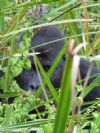|
ESL Forum:
Techniques and methods
in Language Teaching
Games, activities
and teaching ideas
Grammar and
Linguistics
Teaching material
Concerning
worksheets
Concerning
powerpoints
Concerning online
exercises
Make suggestions,
report errors
Ask for help
Message board
|
ESL forum >
Ask for help > has/have
has/have
|

qismat

|
has/have
|
|
which is correct question?
a) how many cousins does Paul have?
b) how many cousins does Paul has? |
8 Apr 2014
|
|
|
|

isa2

|
Do/does/did is always followed by an infinitive.
Therefore answer a is correct.
|
8 Apr 2014
|
|
|

plemos

|
|
For all verbs except for the verb TO BE and MODALS, the present simple question form is
Auxiliar (to do) + subject + INFINITIVE ?
Therefore a) is the correct one.
Hope this helps
Cheers |
8 Apr 2014
|
|
|

dhouha

|
After does, do, did the verbs must be in the infinitive form eg;
Do you speak English ?
Does Samy speak English ?
|
8 Apr 2014
|
|
|

MoodyMoody

|
|
I always put it this way to my students: if you use do in any form as a helping verb/auxiliary, put the change on the do, not the main verb. So, in the simple present for negative, interrogative, or emphatic, put the -s marker on do for the subjects he, she, and it. You get does. Example: Why does it work that way?
You put the past tense marker on the do for the past tense, and get did. Example: I didn �t know that vanilla is sold as vanilla sugar and not vanilla extract in many countries. I always love it when one rule has multiple applications. |
8 Apr 2014
|
|
|

qismat

|
|
thanksssssssss for helping me out
|
9 Apr 2014
|
|
|